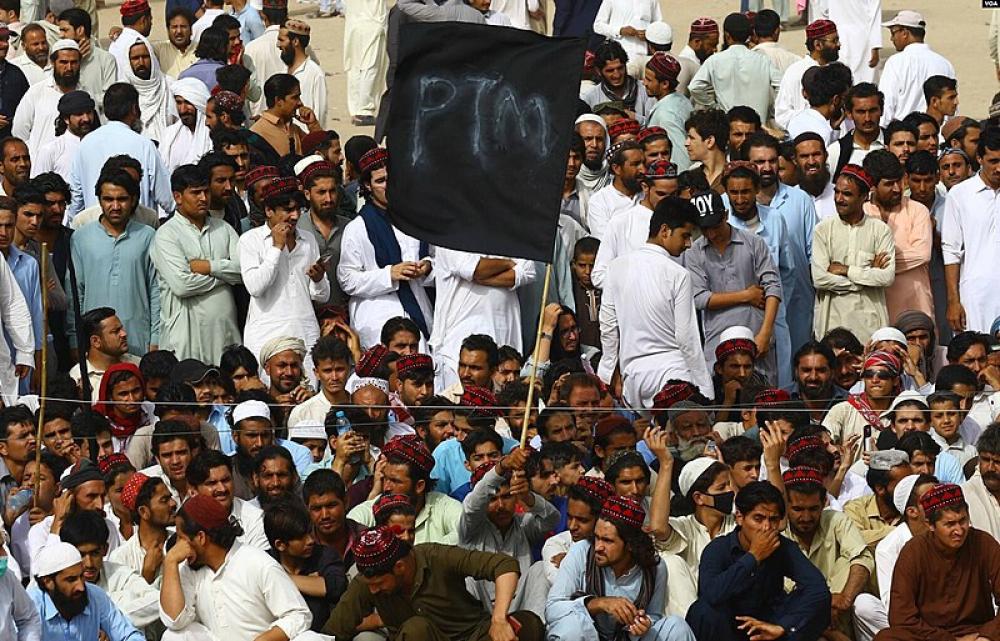Just Earth News | @justearthnews | 30 Aug 2022, 01:07 pm Print
 Pashtun | Pakistan
Pashtun | Pakistan File image of Pashtun Tahafuz Movement (PTM) protest by Voice of America (VOA) via Wikimedia Commons
In a recent interview with Junaid Qureshi of the European Foundation for South Asian Studies (EFSAS), Pakistani journalist and human rights activist Sana Ejaz claimed that Pakistan had been transformed into a prison-like State by the Army and various forces led by the Inter-Services Intelligence (ISI).
Ejaz speaks from personal experience, having been a victim of the aggressive tactics of the Pakistan security establishment.
In 2018, Ejaz was fired from her job as a news anchor at the Peshawar station of Pakistan Television (PTV).
The official reason provided for her termination was the change in timings of the programme she presented, but she was later informed by her manager that she was fired due to “orders from above”.
Sanna Ejaz was targeted by the Pakistan Army due to her activism and association with the Pashtun Tahafuz Movement (PTM) – an organization dedicated to fighting for the human rights of Pashtuns.
The PTM has drawn the ire of the Pakistan Army by bringing attention to the abuses and atrocities it has committed in its efforts to suppress terrorism.
The remote tribal regions of Pakistan are hotbeds of extremism; the Tehreek-E-Taliban-Pakistan (TTP) or the Pakistani Taliban has significant presence in the remote areas of Pakistan.
Being an ideological twin of the Afghan Taliban, the TTP dreams of emulating its Afghan counterpart and installing its own interpretation of Sharia governance in Pakistan.
The Pakistan Army treats the TTP as an existential threat and has resorted to extreme measures to eradicate the military presence of TTP and other extremist groups from the Khyber-Pakhtunkhwa province, Balochistan and other outlying areas.
The Army’s approach to combating insurgency in the tribal belt involved the use of draconian and manifestly discriminatory laws such as the notorious Frontier Crimes Regulation (FCR).
This legislation denied the right to due process and legal representation as well as imposing collective responsibility for crimes to entire tribes.
In addition to the obvious denial of these rights, the application of these regulations treated the residents of these areas in a very different way than the rest of Pakistan.
This discrimination is not incidental. The Pakistan State has always treated its remote areas; FATA, Balochistan and Khyber-Pakhtunkhwa, very differently than the heartlands of Punjab and Sindh.
Despite being the second-largest ethnicity of Pakistan, Pashtuns are under-represented in the higher echelons of the Pakistan Army, Civil Service and positions of corporate power.
Pakistan has come to view entire tribes, regions and ethnicities as suspect and even though the FCR has been repealed, the underlying mentality of viewing the population through the lens of ethnicity and tribal affiliation remains.
In 2014, Pakistan conducted Operation Zarb-E-Azb, a joint military offensive targeted against various militia groups.
This enormous operation was targeted at curbing terrorism and was superficially successful.
The cost of this success was enormous and many of its drawbacks long-lasting.
Almost a million people in North Waziristan along the Pakistan-Afghanistan border were displaced, countless lives were lost and livelihoods destroyed.
The rehabilitation measures that followed this were marred by poor execution and endemic corruption; the blame-game around this botched rehabilitation effort continues to this day.
In her interview, Sana Ejaz claimed that Pakistan authorities were once again seeking to impose an “Urdu-centric understanding of Pakistani nationhood”.
This perception is exceedingly common not just among Pashtuns or in Khyber-Pakhtunkhwa, but also in Balochistan and other remote areas of the nation.
Military operations in remote regions are often conducted with a callous disregard and inevitable treatment of the local residents and their livelihoods as collateral damage.
Punishments based on collective responsibility, extra-judicial executions and enforced disappearances have torn apart many communities.
The enormous collective loss in these regions has lent fuel to separatist demands and peaceful movements for accountability alike.
The Pakistani State does not meaningfully distinguish between the two and meets both with repression and the full force of its control over the legal system.
In doing so, it strengthens the suspicions of its ethnic minorities and their alienation from the political center and pushes them further towards extreme methods and demands of independence.
At the root of this self-reinforcing cycle is the predilection to apply an overly collective and generalized view of Pakistan’s remote regions and their inhabitants.
Unless the Pakistani elite is able to develop a degree of compartmentalization in their view of different segments of Pashtun or Baloch society or their different representative groups, it will be difficult in the extreme for these ethnic minorities from Pakistan’s remote regions to properly integrate into the Pakistani mainstream.
The loss from this will not be faced by the minorities but by the Pakistani State in its inability to enjoy the benefits of a united but diverse Pakistan.
- Viral Irish food bank photo sparks shocking racist attacks on Indians
- Caught on camera: Two foreigners assaulted in Israel in an alleged racial attack
- Pakistan: Parents heartbroken after court sides with man accused of kidnapping minor Christian girl
- Pakistan: Trafficked 35 years ago, Bangladesh-born woman approaches court against FIA for offloading her from flight!
- Hindu tea worker found bound and bloodied in Bangladesh garden during general elections; investigation underway





-1763561110.jpg)
